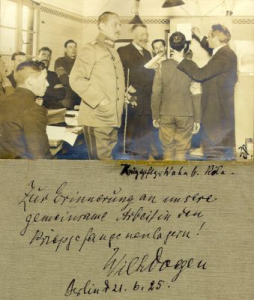One of the unintended consequences of war is that it brings hitherto unconnected groups of people together, for good and for ill. During the First World War, the capture of prisoners of war enabled German anthropologists to study men from Britain, France and their empires. They made sound recordings to help them to understand language, recordings that now offer modern academics the opportunity to study language and dialect as it was a century ago. Natalie Braber looks at the legacy of these recordings.

The British Library holds recordings of many sound files and interviews. If you visit their ‘Sounds’ catalogues, you will see the different archives that you can access. Many of these archives and recordings I use every day for my work. One of the archives is from the Berliner Lautarchiv (the Berlin sound archives). They include recordings of interviews held with British prisoners-of-war in Germany during the years 1915-1918. The collection contains 162 dialect recordings of English speaking POWs from England, Ireland (from what are now Northern Ireland & the Republic of Ireland), Scotland, and Australia, as well as 63 recordings in Scots and one in Scottish Gaelic. Until recently these two collections of early sound recordings of British dialects were inaccessible to all but a handful of academics.
Those POWs recorded from England represent the English dialects and accents of roughly 20 English counties and regions covering the northern areas of Cumberland, Durham and Yorkshire, areas of central England such as Nottinghamshire and Staffordshire, as well as counties located further south including Gloucestershire, Oxfordshire and Kent.
Sound clip: Thomas Jackson (b. 1890, Carlisle)
Sound clip: William Langridge (b. 1893, Sevenoaks)
The men are reading the ‘Parable of the Prodigal Son’ in their native dialect. This text was popular in linguistic surveys at the time and was used, for instance, in sound recordings made between 1913 and 1929 for Grierson’s Linguistic Survey of India. Its academic value derives from the fact it permits a comparative analysis of several grammatical features across a variety of speakers. These recordings of British POWs represent some of the earliest known recordings of ‘ordinary’ speakers. There are also recordings made with POWs of colonial troops: A number of different language speakers from what was then known as British India were also recorded: languages recorded from this region include Hindi, Punjabi, Urdu, Hindustani, Garwhali, Bengali, Khasi, Nepali and Pashto. These recordings tend to focus on folk songs, poems, stories and reciting the alphabet in the speaker’s first language.
Recordings of other indigenous languages were also made and include speakers of African languages such as Yoruba, Hausa, Swahili, Fula, Kikuyu, Anyi, Kanuri, Mali, Wandala and Igbo. Other languages recorded include Afrikaans; Sinhalese; Tamil; Samoan; Malay; and Native American languages such as Arapaho, Cheyenne, Sioux and Iowa.
The causes of the First World War was one of my essay topics at University (in the 1970s). And I didn’t think there was a clear answer.
Then, a few years back, I heard a [German] researcher recounting the details of the discovery of this archive on the radio. On being questioned as to why these recordings had been taken, he explained that it was because the Germans involved were preserving the accents for posterity – because it was anticipated that Germany would win the war, the conquered territories would come to speak German and these voices would be otherwise lost.
Listening, it sent a chill up my spine. It somehow contradicted and invalidated the revisionist culture of my [Baby Boomer] lifetime (that the First World War had been a “mistake”, that both sides were equal in their conduct / values / objectives, etc).
It made me revisit and appreciate my original, factual understanding of the conflict – that it was aggressive German militarism that was the cause of the conflict.
Am I right in this perception?